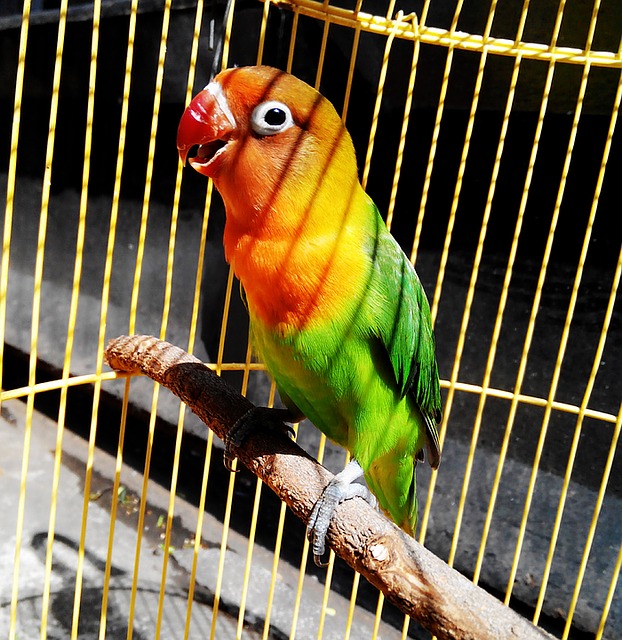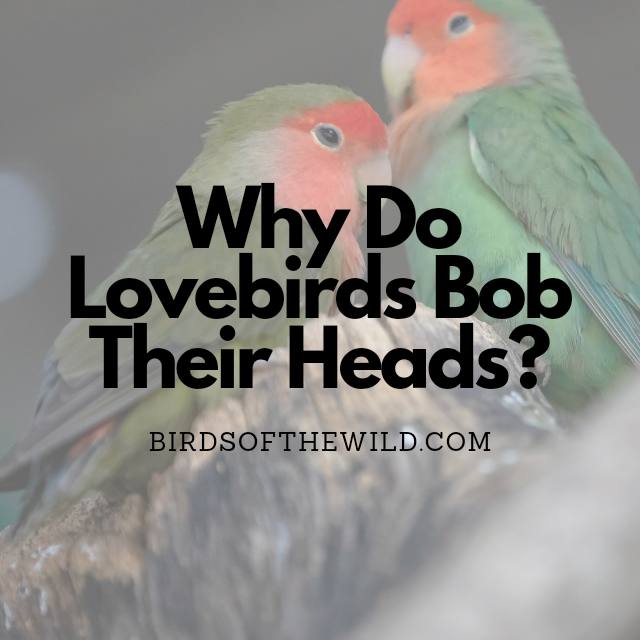Lovebirds are small, colorful parrots that make popular pets, despite their slightly aggressive nature. Nevertheless as parrots, they are social creatures that require plenty of interaction, whether it be from a mate or a human benefactor, which can result in a variety of different behaviours.
One of these being the head bob, which is what lovebirds among other parrots most often use to get attention from their owners. The good news is that head bobbing is normal behavior; understanding what your bird is trying to communicate can help you meet its needs and strengthen your relationship.
So continue reading for a more detailed breakdown of this behaviour below.
When Do Lovebirds Bob Their Head?

Lovebirds are social animals; like humans, they find mates to reproduce with. They may bob their head when looking for a mate as part of an elaborate dance routine. When a female within their species sees this, it would result in one of two outcomes for the male, she will either run away or stay put to see what he will do next.
If the female is interested in mating , she may also start to bob her head and engage in the mating dance. If you see your male and female engaging in this behaviour, it’s best to distance your two birds unless your main goal is to have them reproduce and create a new life.
Another reason why a lovebird may bob their head would be as a sign of territorial aggression; they will do it when trying to protect their food or territory from another bird and when protecting a new born chick from potential predators. This behavior will most likely occur when another bird enters their cage or space.
If you notice your lovebird aggressively bobbing its head, keeping your distance and avoiding entering its territory would be your best course of action otherwise you may develop a flesh wound (trust me on this, I know!)
Are Lovebirds Happy When They Bob Their Head?
Head bobs are most commonly done when a lovebird is expressing happiness, despite how aggressive it may come across to some of us, which of course is another reason why the head bob might pop up as a new behaviour for your lovebird.
In the wild, they will use this behavior to impress females as part of a mating ritual. In a domestic environment, they may also engage in this behavior to attract the attention of their owners. Every bird comes with their own personality, and the more outgoing birds will generally bob their heads more than the quieter ones.
If you reward a lovebirds head bobbing with food or attention, they will be more likely to engage in this behavior in the future as a key way to interact with you and have their needs fulfilled.
Can Lovebirds Be Stressed When They Bob Their Heads?

In general, head bobbing is a positive behaviour as it shows that your little parrot is happy. Still, there are some instances when head bobbing can indicate stress or illness. The best way to identify unhealthy head bobs is to understands your birds daily routine and check to see if their head is bobbing at relatively inappropriate times or constantly even.
If this happens, it could point to an underlying medical condition such as parrot fever, mega bacteria, or protozoal infections.
Parrot fever – also known as psittacosis – is a bacterial infection that can be transmitted to humans. If you notice any unusual behavior, you should test your lovebird for this disease, especially if they spend time around the elderly, who are most susceptible to the transmission of this disease.
Some diseases are difficult to spot, while others come with additional symptoms. For example, feather disease causes teal feathers and poor flight formation, while an iodine deficiency can cause an enlarged thyroid and a voice change in your bird.
Any time you suspect your lovebird to be sick, your first step should be to contact a veterinarian. They can conduct a thorough checkup to determine the health of your bird and administer the proper treatments.
Still, erratic head bobbing isn’t always a sign of illness; it could be your lovebird’s way of telling you they need more stimulation. After all, these birds are social and need time, attention, and enrichment in their daily routine. If they spend much of their day cooped up in a cage, you may notice their head bobbing increase (possibly in combination with other destructive behaviors).
Some easy ways to increase enrichment for your lovebird include the following:
- Play music for them. You can find out what genre they like by playing various songs and listening for chirping to indicate that they like the music.
- You can also play a variety of nature sounds or a recording of your voice. These can keep your bird stimulated and comfort them when you’re away from home.
- Provide fruits and veggies in their enclosure, such as chopped apples, diced mango, chopped broccoli, or grated carrots.
- Buy a buddy for your budgie. Lovebirds are highly social animals who thrive in large groups in the wild (though be very careful here as they can also be quite aggressive). Unless you can dedicate a significant amount of time to your bird, then a companion is one of the best ways to provide enrichment.
- Move their cage around so that they can look at new environments.
- Provide them with toys and foraging materials to help prevent boredom.
Summary
All in all lovebirds bob their heads for many of the same reasons other smaller and larger parrots tend to do, whether it be done as a mating dance when the season is ripe or when protecting their kin and territory from competition or predators.
As domesticated pets, the head bobing is done for very much the same reason, whether it be to grab your attention or to ward of unfamiliar guests.
Amhil Khan, a dedicated nature enthusiast and the founder of BirdsOfTheWild.com, is a passionate advocate for the captivating world of avian wonders. With a deep-seated curiosity about the intricate lives of birds, Amhil’s journey began as a fascination and has evolved into a mission to inspire others to appreciate and protect these magnificent creatures.
Amhil’s love for birds led to the creation of Birds of the Wild, a platform where his expertise in ornithology, coupled with his captivating storytelling, provides readers with an immersive and educational experience. Through his lens and words, he captures the essence of birds in their natural habitats, offering a glimpse into their behaviors, migrations, and the ecosystems they inhabit.

